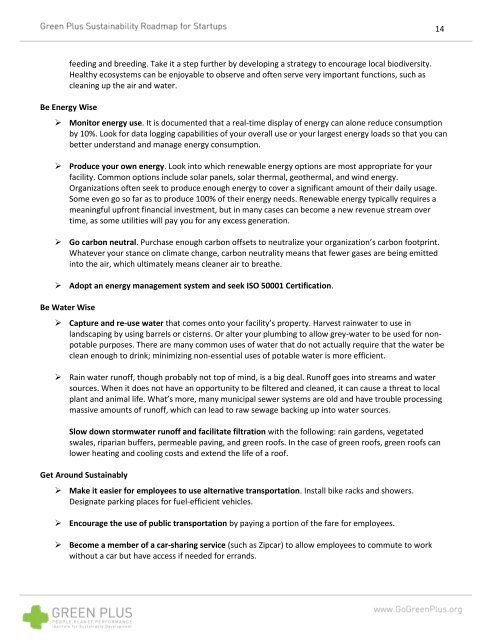Sustainability Roadmap for Startups - Green Plus
Sustainability Roadmap for Startups - Green Plus
Sustainability Roadmap for Startups - Green Plus
You also want an ePaper? Increase the reach of your titles
YUMPU automatically turns print PDFs into web optimized ePapers that Google loves.
14<br />
feeding and breeding. Take it a step further by developing a strategy to encourage local biodiversity.<br />
Healthy ecosystems can be enjoyable to observe and often serve very important functions, such as<br />
cleaning up the air and water.<br />
Be Energy Wise<br />
‣ Monitor energy use. It is documented that a real-time display of energy can alone reduce consumption<br />
by 10%. Look <strong>for</strong> data logging capabilities of your overall use or your largest energy loads so that you can<br />
better understand and manage energy consumption.<br />
‣ Produce your own energy. Look into which renewable energy options are most appropriate <strong>for</strong> your<br />
facility. Common options include solar panels, solar thermal, geothermal, and wind energy.<br />
Organizations often seek to produce enough energy to cover a significant amount of their daily usage.<br />
Some even go so far as to produce 100% of their energy needs. Renewable energy typically requires a<br />
meaningful upfront financial investment, but in many cases can become a new revenue stream over<br />
time, as some utilities will pay you <strong>for</strong> any excess generation.<br />
‣ Go carbon neutral. Purchase enough carbon offsets to neutralize your organization’s carbon footprint.<br />
Whatever your stance on climate change, carbon neutrality means that fewer gases are being emitted<br />
into the air, which ultimately means cleaner air to breathe.<br />
‣ Adopt an energy management system and seek ISO 50001 Certification.<br />
Be Water Wise<br />
‣ Capture and re-use water that comes onto your facility’s property. Harvest rainwater to use in<br />
landscaping by using barrels or cisterns. Or alter your plumbing to allow grey-water to be used <strong>for</strong> nonpotable<br />
purposes. There are many common uses of water that do not actually require that the water be<br />
clean enough to drink; minimizing non-essential uses of potable water is more efficient.<br />
‣ Rain water runoff, though probably not top of mind, is a big deal. Runoff goes into streams and water<br />
sources. When it does not have an opportunity to be filtered and cleaned, it can cause a threat to local<br />
plant and animal life. What’s more, many municipal sewer systems are old and have trouble processing<br />
massive amounts of runoff, which can lead to raw sewage backing up into water sources.<br />
Slow down stormwater runoff and facilitate filtration with the following: rain gardens, vegetated<br />
swales, riparian buffers, permeable paving, and green roofs. In the case of green roofs, green roofs can<br />
lower heating and cooling costs and extend the life of a roof.<br />
Get Around Sustainably<br />
‣ Make it easier <strong>for</strong> employees to use alternative transportation. Install bike racks and showers.<br />
Designate parking places <strong>for</strong> fuel-efficient vehicles.<br />
‣ Encourage the use of public transportation by paying a portion of the fare <strong>for</strong> employees.<br />
‣ Become a member of a car-sharing service (such as Zipcar) to allow employees to commute to work<br />
without a car but have access if needed <strong>for</strong> errands.


